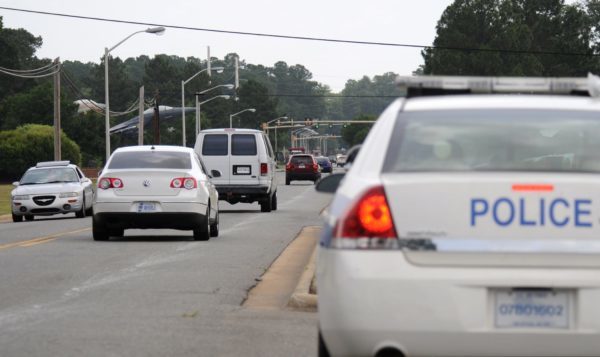
“License and registration please.” Four words no one ever wants to hear. But sometimes even the best drivers exceed the speed limit and find themselves facing a massive ticket. Other than an unexpected dent to your wallet and points on your driving record, how else can a speeding ticket negatively impact you?
Setting aside possible reckless driving charges, DWI and other offenses while driving (those exceed the scope of this article), the biggest impact is likely to be on your automobile insurance.
Where You Live Determines Ticket Impact
How much can a speeding ticket impact your insurance premium? Quite a lot depending on where you live. Different municipalities in Texas charge different amounts, and sometimes it varies significantly for speeding tickets. City and county courts may also have different fines. Insurance companies each have their own guidelines so it’s impossible to be exact, but a good rule of thumb is to expect a 15-40 percent jump for the vehicle/driver that had the unfortunate experience.
Lubbock County residents face some of the largest insurance increases in the entire state of Texas. After a speeding ticket, the average Lubbock driver’s yearly costs will increase from $1,069.56 to $1,218.00, a total of $445.32 over three years, not including the ticket.
Points on a Texas Drivers License
Typically, the points you receive for speeding tickets remain on your driving record for 3-5 years. As a result, insurance premium increases can last that long as well. In Texas, moving violations add two points to your record while moving violations that result in an accident are three points. Like golf, the fewer points you have, the better driver you’re considered to be by both the state and your insurance company. Want to check how many points are on your driving record? Go to the Texas Department of Public Safety’s website.
Many insurance companies generally use the guidelines set up by the Insurance Services Office (ISO) to dictate their points system, while others create their own unique metrics. These points dictate how much you’ll pay in premiums, however the exact points and system used are rarely revealed by the insurer. Generally speaking, you are considered a high-risk driver after tallying more than six points on your driving record in Texas. Being considered high risk means you won’t qualify for preferred coverage (lowest rates) and you are likely to pay much higher premiums than average. Keep in mind if you accumulate too many violations your insurance company can cancel your policy for being too high of a risk to insure. The exact threshold for when your policy could be dropped, varies among insurance plans.
Avoiding an Auto Insurance Increase

Of course, there’s good news too: just because you got a speeding ticket doesn’t automatically mean your insurance will go up. Insurance carriers are not immediately notified when you receive a ticket. In most cases your record will be pulled on a yearly basis near your policy renewal date. If a traffic ticket is received after the pull occurs, you can avoid or potentially delay a premium increase for nearly a year. Some insurance carriers offer ticket forgiveness for the first violation. This could create a situation where it is more advantageous to stay with your current carrier.
Outside of your insurance provider forgiving the infraction, there are other ways to prevent a ticket from going on your driving record. If you feel the ticket is undeserved, consider contesting the ticket in court. Typically, only about 5% of ticketed drivers do this, but it could result in complete ticket dismissal if you have a justified argument. For example, are there any errors on the ticket such as the wrong date or location?
You could also seek mitigation in court, which allows you to ask a judge to keep a violation off your driving record. Deferred adjudication means a ticket won’t be added to your driving record if you keep a clean driving record for period of time. Often the simplest and cheapest method to get your ticket dismissed is to take a defensive driving class. Just keep in mind this is considered as an option only 1 time per year in Texas, and lastly, it’s up to the judge whether this option is available. Excessive speed, age of the operator, and whether a school zone is involved can be reasons a deferred adjudication and defensive driving may not be available to a particular driver.
Other Factors that Increase Car Insurance
If you’re still stuck with a ticket on your record and face higher premiums, you may be able to reduce your costs by changing your coverage. Whether this option is a smart decision depends on your personal insurance needs and driving habits. Always consult with your insurance agent before decreasing coverage.
Insurance premium rates can also increase from other factors, besides a speeding ticket. In addition to a driver’s history, age, and gender, insurance premiums can increase if you move to a new city. The average crime rate and weather of where your vehicle is parked can affect car insurance rates.
It’s always a good idea to speak with an independent insurance professional to help you lock in the lowest rate and evaluate increases to a policy cost. Agents can determine appropriate coverage depending on a number of important variables, accounting for whether you have a speeding violation.
At the end of the day, even the best drivers face the possibility of a speeding ticket. If you receive a ticket, don’t feel ashamed or embarrassed. In fact, in 2015 more than 300,000 speeding tickets were issued in Texas. It happens to nearly everyone, simply take steps to mitigate the impact on your insurance and next time keep a close eye on the speed limit!
-- Life Insurance Instant Quote and Apply Tool @ GetLifePolicy.com > * Quick self-service term life insurance quote. With or without medical exam.
-- Call us about Auto, Home, Business, Life, or Health insurance. * Click to Call (806) 798-7800, Mon-Fri 8:30am-5pm (lunch closed Noon-1pm)
-- Come see us @ our new address 4720 S Loop 289 Lubbock, TX 79414 (maps link), or get your online quote started at https://GetHettler.com




